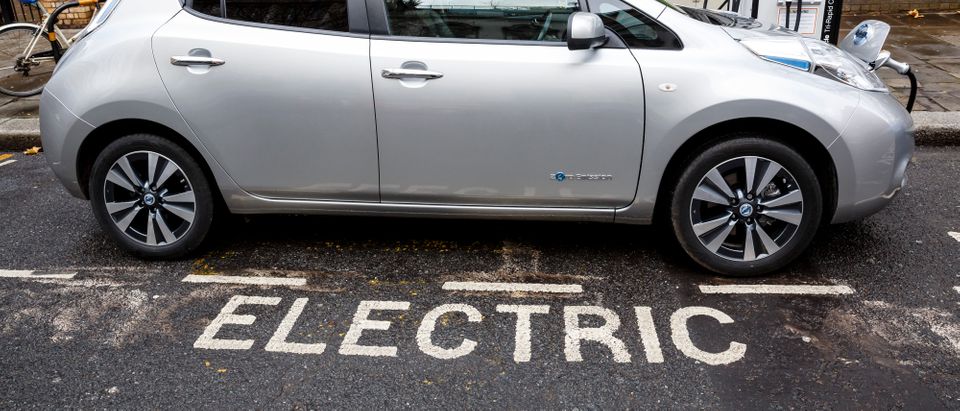Mere weeks before General Motors announced its new plan to “cut up to 14,000 workers in North America and put five plants up for possible closure as it abandons many of its car models and restructures to focus more on autonomous and electric vehicles,” the auto giant managed to scrap together the funds necessary to grow at least one part of its payroll: Washington, D.C. lobbyists.
Despite the devastation these cuts pose to workers in our country’s heartland, GM went on a hiring spree in our country’s capital to extend its windfall from Washington.
Bloomberg reports that GM joined titans like Tesla earlier this month on a new lobbying push — the “EV Drive Coalition” — aimed at extending taxpayer-funded credits for electric vehicles by lifting the current 200,000 cap per manufacturer.
As more and more of these corporations prepare to also join Tesla in reaching that 200,000 limit, this latest effort is a blatant attempt at keeping their coffers as green as their astroturf lobbying group.
Only making matters worse for the middle class, a recent study conducted by NERA Economic Consulting found that in the No Cap Limit scenario multi-billion dollar corporations are peddling for their millionaire consumers, “total personal income of all U.S. households decreases by $7 billion in 2020 and $12 billion in 2035” on top off “higher total electricity costs” for ratepayers.
While GM’s layoffs will hurt middle-class Americans who power domestic plants in Michigan, Ohio, and Pennsylvania, its lame-duck push would help one state in particular: California. The federal tax credit — a full $7,500 per electric vehicle sold under the aforementioned threshold — has emerged as a golden ticket for the Golden State.
Per an International Council on Clean Transportation report published earlier this year, “Half of all U.S. electric vehicle sales in 2017 were in California.” Between 2010 and 2017, California accounted for 49 percent — 366,000 out of 749,000 — of all EVs in America.
Accordingly, five of the seventeen cosponsors of the Electric CARS Act of 2018 — a similar proposal to the one the EV Drive Coalition is recklessly trying to ram through during these last remaining weeks of the lame-duck session — come from California, which is a far higher number than any other state.
Additionally, as has been confirmed many times over by a slew of data sets and studies — including those conducted by the Pacific Research Institute CarMax / CleanTechnica and the U.S. Department of Transportation — electric vehicles are almost exclusively enjoyed by the wealthy.
Take, for example, the 2015 working paper by energy economists at the University of California, Berkeley — hardly a bastion of conservative thought. The paper found that “U.S. clean energy tax credits have gone predominantly to higher-income Americans.”
In fact, in the “most extreme” example of how these tax credits overwhelmingly benefit the wealthy, the top income quintile has received about 90% of all Qualified Plug-in Electric Drive Motor Vehicle Credits (PEDVC). Meanwhile, “the bottom 80% of filers receive a little more than 10 percent of all credits, and the bottom 90 percent of filers receive only about 40 percent of all credits.”
As economists at the state’s flagship university subsequently conclude, “it may simply be that electric vehicles … are only affordable for relatively rich households.”
Unsurprisingly, therefore, the tax subsidy carved out for giant electric vehicle companies and the most affluent among us isn’t just electrifying cars – it is also electrifying constituents of the lawmakers who will soon decide its fate.
Nearly 70 percent of those surveyed in a recent poll released by the American Energy Alliance “are resistant to the idea that they should pay for people to buy electric vehicles.” Another 72 percent, meanwhile, said they “did not trust the federal government to make decisions about what kinds of cars or transportation technologies should be subsidized or mandated.”
Any lawmaker or lobbying firm fighting to save these subsidies clearly isn’t plugged into the energy of the taxpayers and ratepayers who fund them.
Before these electric vehicle tax loopholes get the chance to drive up our debt — and your bills — even further, Congress must reject this last-ditch effort in this lame-duck session.
Electric vehicle tax credits — which have earned the ire of President Trump — are nothing more than subsidies for luxurious toys of the rich. Lawmakers should seek to rid, not re-up, such an unfair burden on the types of middle-class families already harmed by GM’s firings.
George Landrith is the president of Frontiers of Freedom, an educational foundation whose mission is to promote a strong national defense and peace through strength.
The views and opinions expressed in this commentary are those of the author and do not reflect the official position of The Daily Caller.


